News
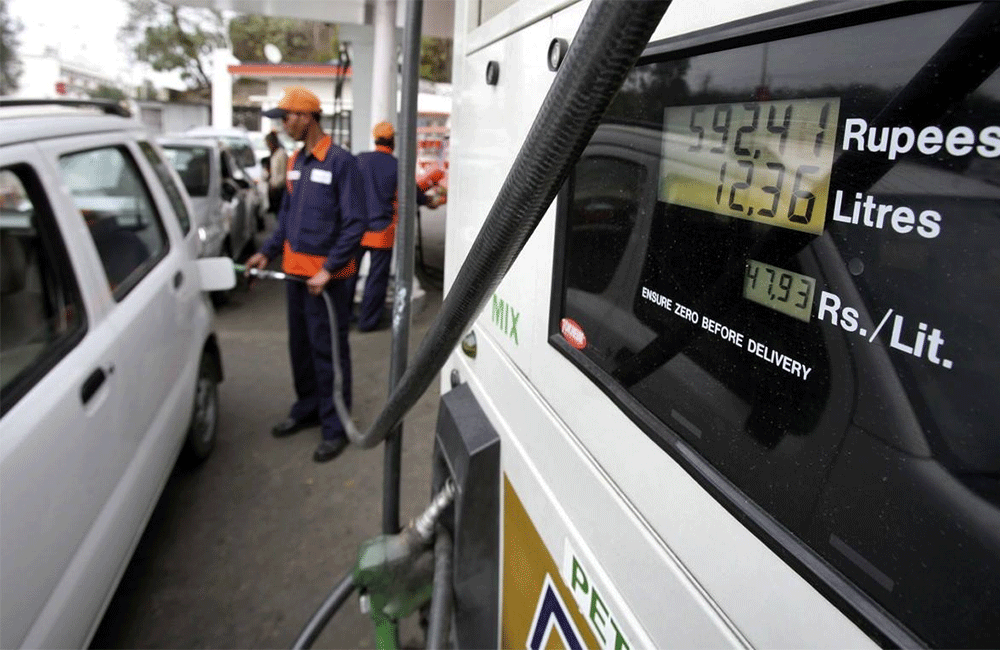
Is LIOC handing its profits to high profile members of the Government?
Although prices of crude oil in the world market have plunged to historic lows, the Indian Oil Company (LIOC) has failed to reduce the fuel prices in Sri Lanka. As a result of this, the LIOC has amassed additional profits to the tune of billions of rupees. Many have taken to social media to raise suspicions as to whether a part of the huge profits made by the LIOC has been given to certain politicians and their election campaigns.
Close links between Manoj Gupta, the Managing Director of LIOC and certain government bigwigs and senior officials have further fueled the suspicions raised on social media.
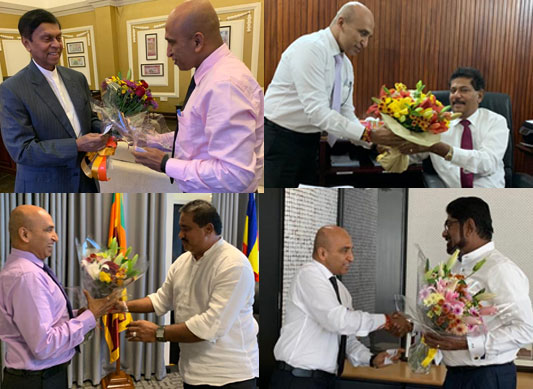
Even though crude oil prices in the world market have fallen to historic lows, failure to take advantage of low prices and pass on the benefit to Sri Lankan consumers by the government has allowed the LIOC to make billions of rupees in additional profits.
Though the country's economy is in shambles due to economic mismanagement and reckless, ad hoc decisions taken by the incumbent government, it is baffling to see why they haven't used at least a portion of the huge profits earned by the LIOC to provide some sort of relief to an ailing economy, political analysts claimed.
Fuel prices in the world market
According to a report issued by the Central Bank of Sri Lanka (CBSL) yesterday (11), the price of a barrel of Brent crude oil in the world market was USD 30.11. Last week, a barrel of crude oil was recorded at just USD 25.
Meanwhile, the price of a barrel of petroleum products has come down to USD 24.
During the previous good governance government's period, the price of a barrel of Brent crude oil in the Singapore market was USD 65. Accordingly, the prices of oil in the local market were revised as per the fuel price formula in September 2019.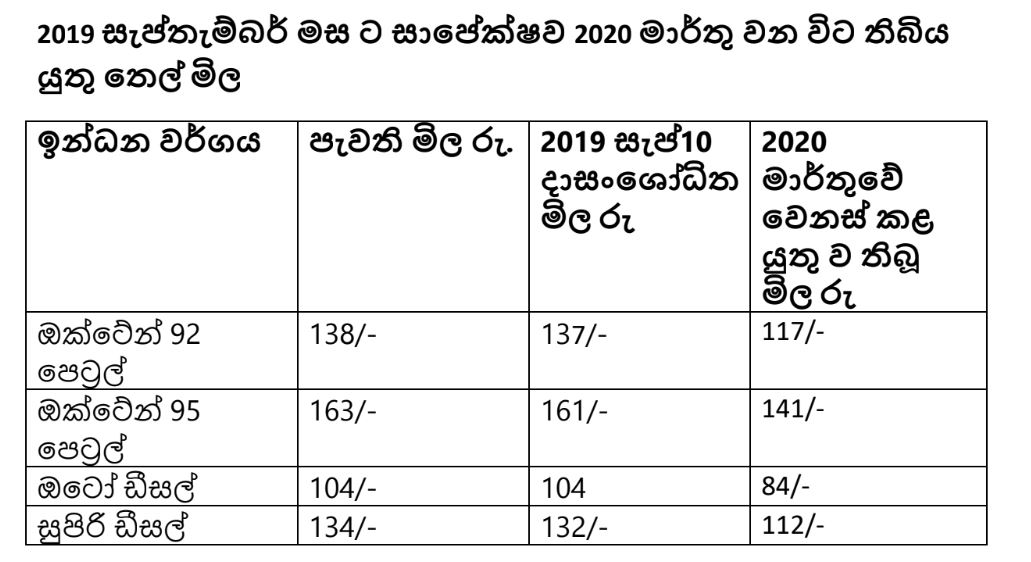
Due to the fuel price formula, the LIOC priced a litre of octane petrol at LKR 137 while a litre of diesel was priced at LKR 104 while maintaining maximum profit margins in September 2019.
Accordingly, former Finance Minister Mangala Samaraweera in a press release in March noted that the current government could reduce the price of a litre of petrol and diesel by atleast LKR 20, compared with the world oil prices in September 2019 and March 2020, if they were genuinely concerned with providing relief to the general public.
However, at a time when the price of crude oil in the world market has decreased even further, the government could very well reduce the price of a liter of both petrol and diesel by at least LKR 50.
'SL VLOG', a popular programme that airs on YouTube recently revealed how the Lanka Indian oil Company (LIOC) is engaged in making huge profits when global oil prices are decreasing drastically.

Police arrest two youths for posting about lack of food on Facebook
Police have arrested two youth who claimed that a group of upcountry Tamils who have sought refuge in a Hindu temple in the capital, unable to return home due to the Covid 19 curfew, were lacking food and drinking water.
The two youth who took to social media to publish the information have been arrested on 4 May and produced in court, reports ‘Anidda’ Sinhala weekly.
Fifteen Tamils from Haputale and Badulla districts employed in Colombo had been unable to return since a curfew was declared in the Colombo district and travel between districts restricted. A secretary of Seenthil Thondaman, son of Ceylon Workers Congress (CWC) Leader Arumugam Thondaman has intervened to get them shelter at the reception hall of Mutwal Sri Venkateswara Kovil.
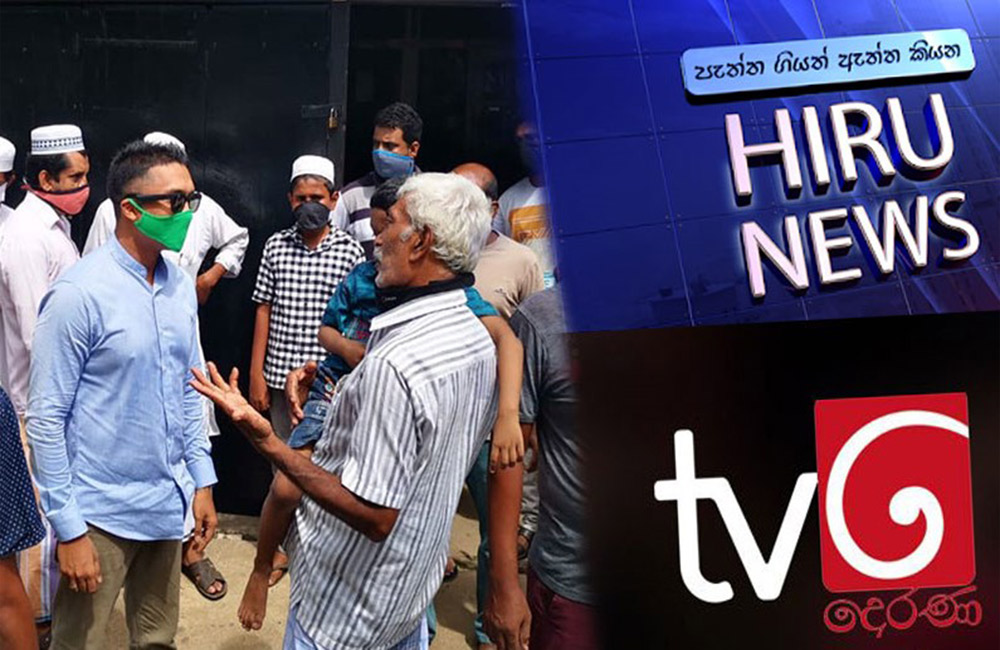
Weligama Mayor takes a stance against unethical media coverage
A local government body in southern Sri Lanka slapped a ban on journalists following the unethical coverage of a suspected coronavirus victim by two pro-government private TV channels. The victim was later cleared of Covid- 19.
The mayor of Weligama alleges that Hiru TV and Derana TV journalists have unlawfully entered the house of the suspected Covid19 victim and filmed the premises causing shock and distress to family members.
“By the powers vested to me under the Urban Council Act of 1987 (255) section (4), I am hereby banning the unauthorised entry of any media personal into the private vicinities of suspected Covid 19 cases,” Said Mayor Rehaan D.W Jayawickreme in a strongly worded letter to channel heads of Derana TV and Hiru TV.
“In the event that these warnings are not heeded, I will not hesitate to not only initiate legal action against your channel, but will also instruct the relevant public health officials (PHI) working under me, to file separate charges in regard to the obstruction of their duties.”
TV channels in Sri Lanka have been heavily criticised for criminalising Covid-19 victims by their coverage.
“It is of paramount importance to note that our country along with the rest of the world is going through turbulent times due to this disease but it is only in Sri Lanka that I have seen patients been treated as criminals,” says Mayor Jayawickreme.
The politician believes that such a environment has been created by journalists who broadcast recordings of pandemic victims and their families without consent.
Although Sri Lankan journalist in print media have been issued with a code of ethics, the broadcast industry doesn’t have any known guidelines.
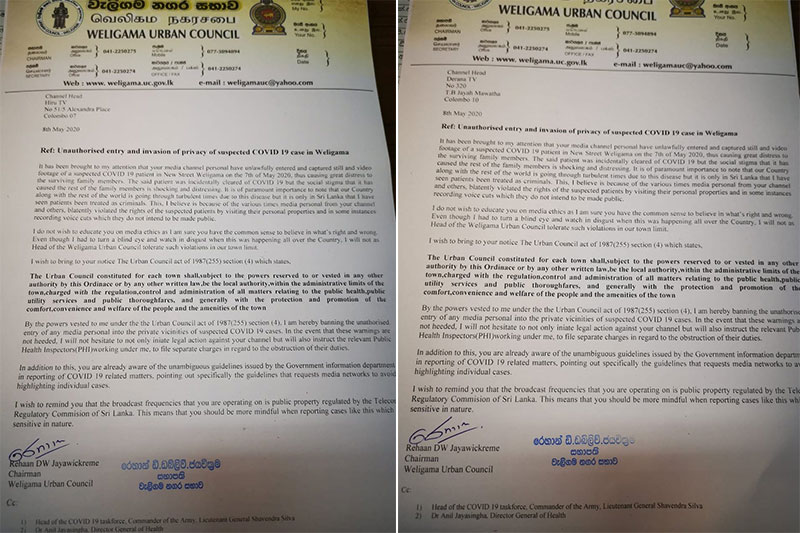
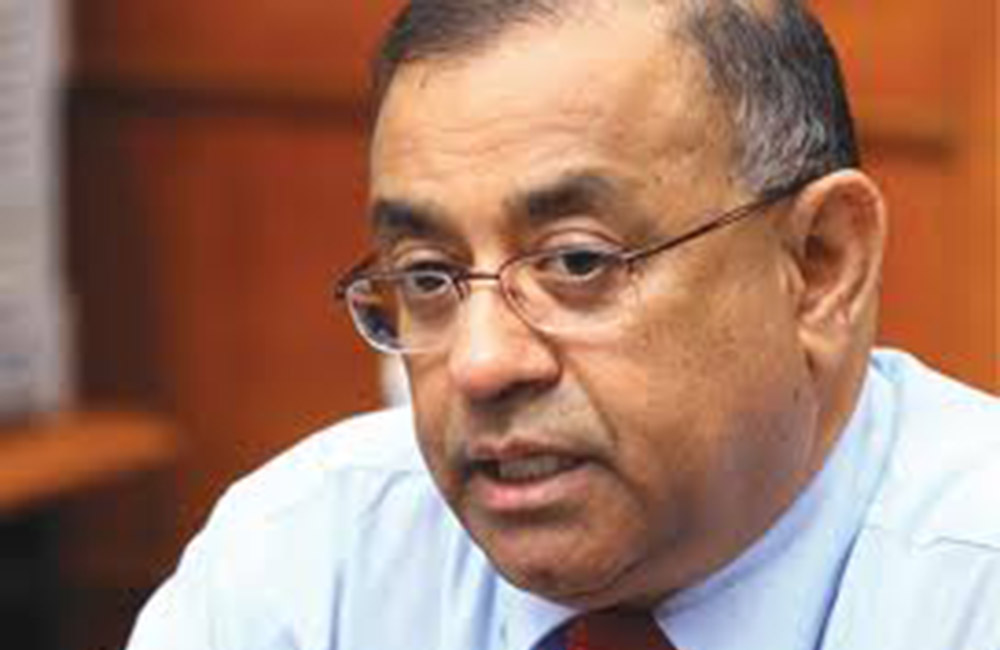
Sri Lanka asks public servants to hand back next month’s paycheck
Heavily burdened with mounting debt, Sri Lanka president’s office has requested public sector staff to hand back their next month’s salary.
The country’s top state official who made the appeal believes that the contribution will enable the government to service the debt and reduce the budget deficit.
According to the latest report by the Central Bank Sri Lanka’s foreign debt exceeds USD 55 billion.
“The government needs nearly 1000 billion rupees every month to pay salaries and allowances in the public sector,” said President’s Secretary P.B Jayasundera in a four-page letter addressed to all heads of public institutions.
He appealed to donate a month’s salary so that "the country’s May expenditure will go down and the income will go up enabling us to reduce the budget deficit."
President Gotabaya Rajapaksa has rejected repeated calls by the opposition to reconvene the dissolved parliament in order to assist the government in fighting the hardships faced with the Covid-19 pandemic.
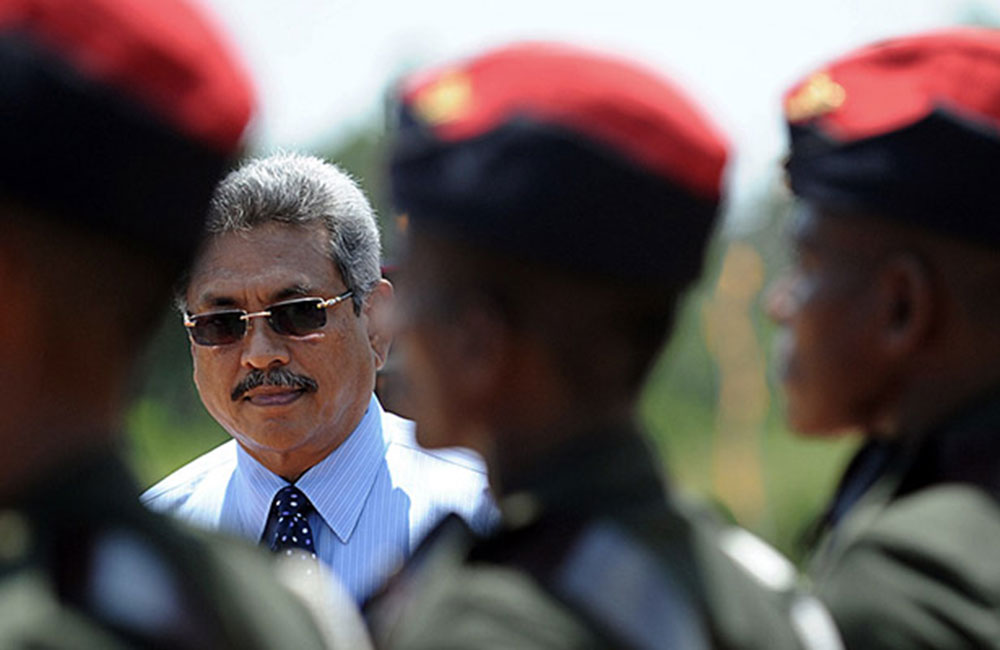
Concerns raised over lack of oversight on Covid-19 response
Sri Lanka public administration, all prevention and management of the COVID-19 virus outbreak and healthcare provisions and other economic activities are now being carried out with the engagement of retired military officers on the directions of the President Gotabaya Rajapaksa.
The lack of civilian oversight over Sri Lanka’s militarised COVID-19 response raises some very serious human rights concerns, said the International Truth and Justice Project.
Experienced professionals from the civil service should be in charge of coordinating complex public health and distribution issues, not the Army,” ITJP’s Executive Director Yasmin Sooka, emphasized recently.
Major General Sanjeewa Munasinghe has been appointed as the Secretary to the Ministry of Health replacing the present secretary Ms. Badrani Jayawardena.
He is an alumnus of the Faculty of Medicine of University of Ruhuna. He completed his MBBS degree in 1986 and joined the Sri Lanka Army in the same year.
With Major General Munasinghe’s appointment as the Health Secretary, the number of present and ex-military officers in top public administration previously confined to Sri Lanka Administrative Service has risen up to 10.
These military appointments raise the question as to who in the civilian administration will be held accountable for activities carried out by them, civil society activists said.
They noted that Sri Lanka‘s strategic nerve centres like the defense ministry, Colombo port, Sri Lanka Customs, Consumer Affairs Authority, Lotus Tower Project etc are now under the purview of military officers.
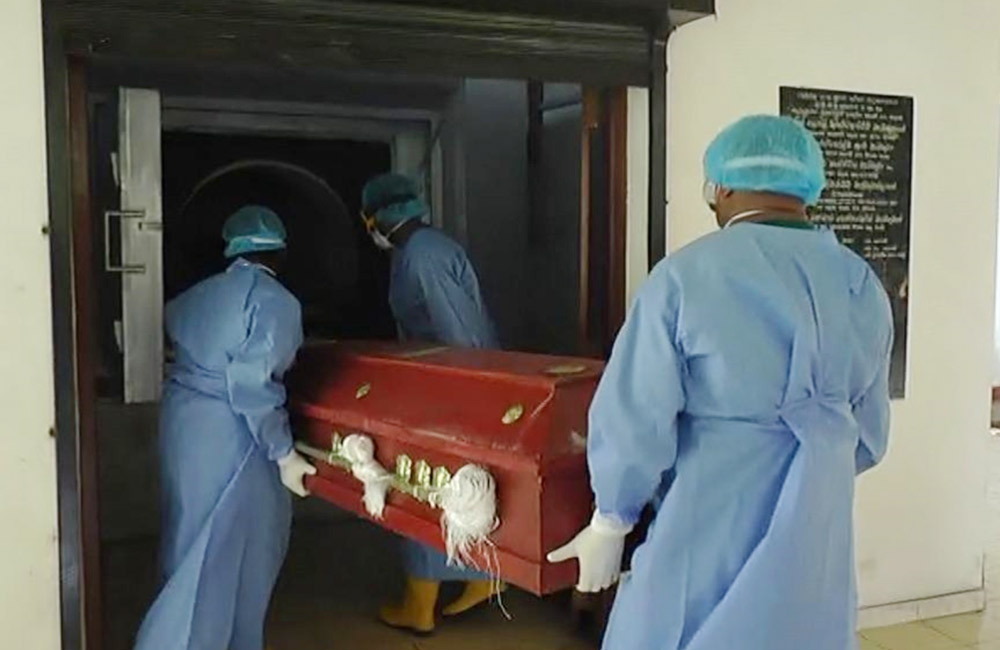
Sri Lanka registers Ninth death due to COVID-19
Army chief General Shavendra Silva, who heads Sri Lanks's COVID-19 prevention mechanism, on Tuesday said, "There were 33 new positive cases found at midnight (Monday), 31 of them are our gallant sailors who are linked to the Welisara camp. The two others are their contacts."
The COVID-19 infection is suspected to have spread in the Welisara Camp near capital Colombo when officers came in contact with drug addicts infected by the virus during a raid.
The sailors had gone home on leave, spreading the virus further.
Silva said 752 positive cases were reported in the country since its first positive case in mid-March, of which 194 patients had been discharged from hospitals after complete recovery.
The Army chief said 1,008 relatives of Navy sailors are presently in quarantine.
The virus death rose to eight on Monday after a 72-year-old woman in northwestern Kurunegala region died of the disease.
The woman was related to one of the infected sailors.
President Gotabaya Rajapaksa on Monday spoke at an online summit of the Non Aligned Movement (NAM), a forum of around 120 developing countries.
Rajapaksa said of all the polymerase chain reaction (PCR) tests only 3 per cent gave positive results and that the virus' mortality rate in Sri Lanka was less than 1 per cent.
The president said he intends to ease restriction to revive economic activities, while enforcing health guidelines.
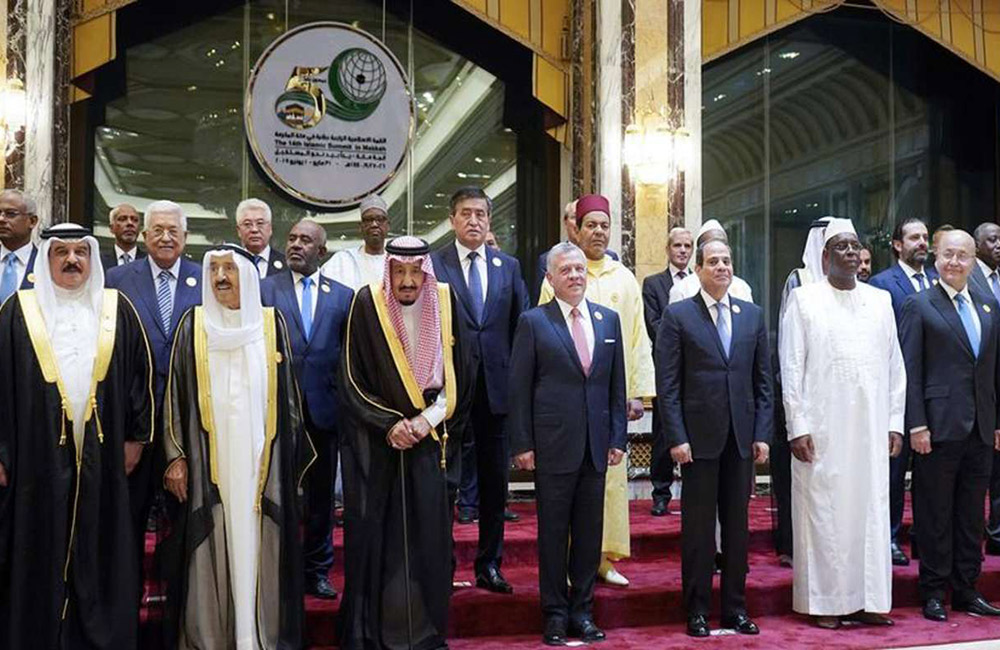
Anti-Muslim hatred in Sri Lanka angers powerful Islamic bloc
In a strongly worded statement, the Organization of Islamic Cooperation (OIC) has also expressed its opposition to cremating bodies of Coronavirus victims.
“General Secretariat of the Organization of Islamic Cooperation (OIC) expressed its deep concern over reports on escalating hate speech and hostility towards Muslims in Sri Lanka, the promotion of biased and rejected allegations holding members of the Muslim community responsible for the spread of the novel Coronavirus pandemic (COVID-19) in the country as well as reports that authorities cremated bodies of the Muslim victims of the pandemic and arrested community members who rejected these practices,” said the statement.
“In this regard, the OIC reaffirmed its firm position rejecting all policies and practices targeting the rights of Muslims anywhere. Furthermore, it called on the authorities in Sri Lanka to ensure the safety, security and rights of the Muslim community, as well as commitment to respect their religious practices and rituals, safeguard their dignity and to stand firmly against all parties behind the promotion of hatred, Islamophobia, and anti- Muslim sentiment in Sri Lanka.”
The OIC also stressed that the current global juncture requires the involvement of all actors in strengthening the bonds of cooperation and the values of solidarity among states and consolidating cohesion and synergy among constituents of each state to collectively and effectively respond to COVID-19 pandemic and its repercussions on all societies.
The Organization of Islamic Cooperation is the 2nd largest inter-governmental organization after the UN with 57 member states.

Modalities to issue temporary travel documents to undocumented workers abroad agreed on
Modalities to issue temporary travel documents to undocumented workers abroad following proper authentication procedures has been agreed on by the Department of Immigration and Emigration. This follows consultations between the Ministry of Foreign Relations, Ministry of Skills Development, Employment and Labour Relations and Sri Lanka Bureau of Foreign Employment (SLBFE). It is intended to facilitate the repatriation of migrant workers, once the Government decides on a timeline for their repatriation.
This was discussed at a meeting convened today (04 May 2020) by the Minister of Foreign Relations, Skills Development, Employment and Labour Relations, Dinesh Gunawardena with the relevant line agencies.
The interest expressed through the ‘Contact Sri Lanka’ portal by migrant workers to return and the amnesties presently declared by Kuwait and Jordan were reviewed. The vulnerability faced by migrant workers particularly in the Maldives and possible measures to address it, was also discussed. The programme by the Foreign Ministry and the SLBFE to provide dry rations to the Sri Lankan migrant communities most affected was also assessed.
Minister Gunawardena briefed those present on the negotiations that have taken place with the foreign governments concerned and efforts being made to be responsive to these governments, while ensuring that any repatriation remains consistent with the ongoing quarantine process.
Foreign Secretary Ravinatha Aryasinha, Senior Additional Secretary (Development) of the Ministry of Skills Development, Employment and Labour Relations Sujeewa Thissera, Controller General of Department of Immigration & Emigration Sarath Rupasiri, Chairman of Sri Lanka Bureau of Foreign Employment Kamal Ratwatte, and other Senior Officials, participated at the meeting.
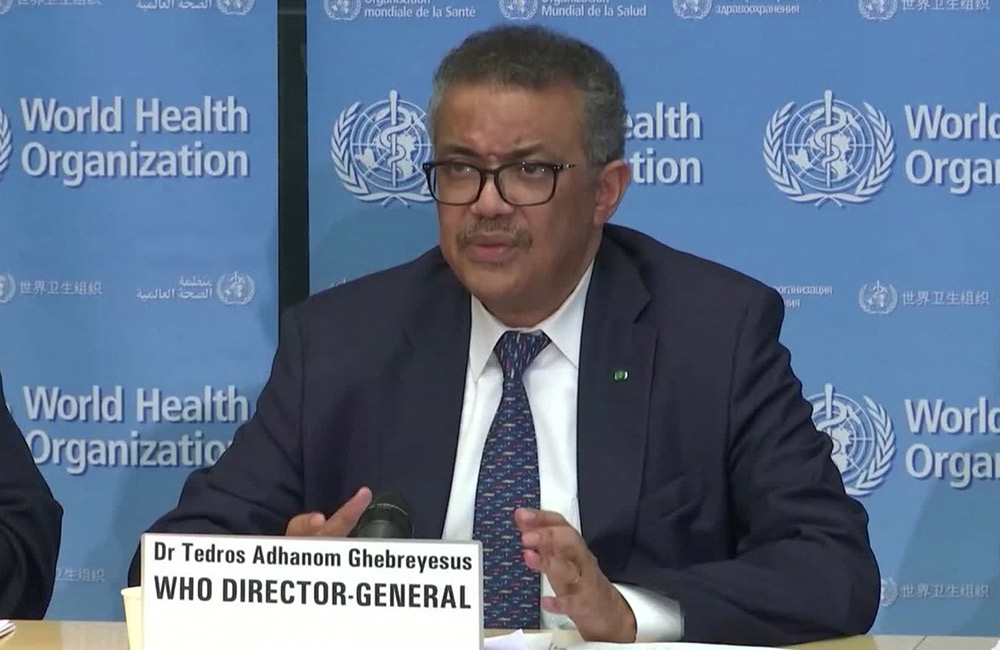
WHO cautions countries over easing Covid-19 lockdown
The World Health Organisation (WHO) has announced guidelines to be considered before relaxing restrictions in place to contain the spread of the Covid-19 pandemic
"As more and more countries consider how to ease so-called lockdown restrictions, I want to reiterate the six criteria that WHO recommends countries consider," said WHO head Tedros Adhanom Ghebreyesus.
“First, that surveillance is strong, cases are declining and transmission is controlled;
Third, that outbreak risks are minimized in special settings like health facilities and nursing homes;
Fourth, that preventive measures are in place in workplaces, schools and other places where it’s essential for people to go;
Fifth, that importation risks can be managed;
And sixth, that communities are fully educated, engaged and empowered to adjust to the "new norm".
The President’s Office in a statement said that public and private sector companies in the high-risk districts of Colombo, Gampaha, Kalutara, and Puttalam can resume operations on May 11.
Accordingly, private companies can resume operations at 10 am, while employers can choose the number of workers who should report to work.
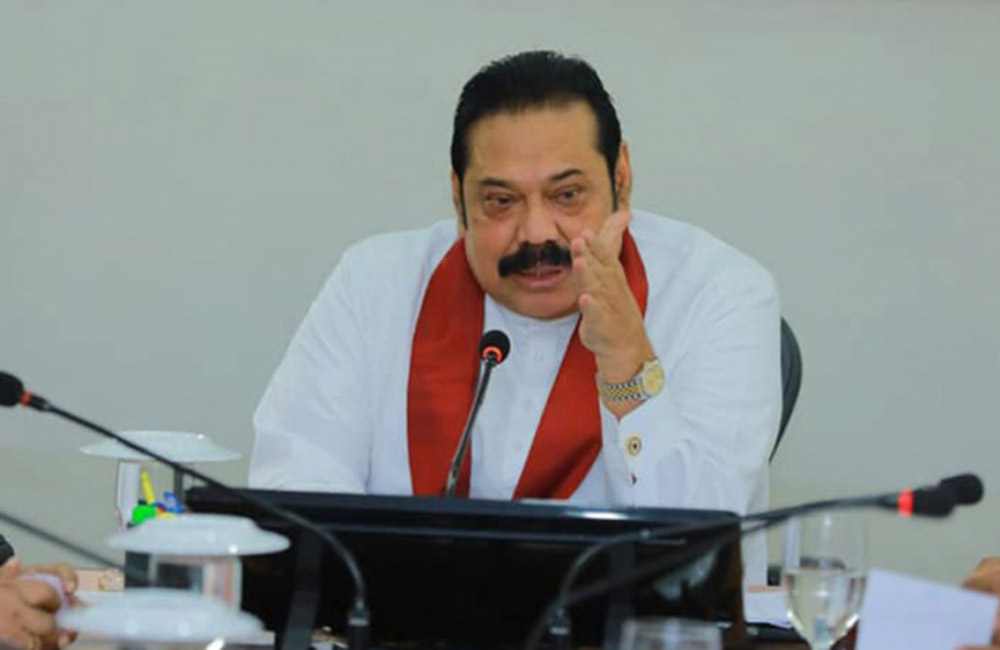
Sri Lanka yet to receive World Bank funds for COVID-19 assistance: PM
Millions of dollars pledged by the World Bank a month ago to aid Sri Lanka in the fight against the COVID-19 pandemic has not reached the country according to the government.
On Monday (04), Prime Minister Mahinda Rajapaksa told a group of former parliamentarians that the government had not received any foreign funding with regard to the COVID-19.
In April, the World Bank announced that its Board of Executive Directors approved the USD 128.6 million 'Sri Lanka COVID-19 Emergency Response and Health Systems Preparedness Project' to help the country prevent, detect, and respond to the COVID-19 pandemic and strengthen its public health preparedness.
“Although the World Bank had agreed to provide assistance of USD 128.6 million and signed agreements, the funds have not reached this country, and the funds are expected in future," said the secretary of the finance ministry through a statement from the Prime Minister's office.
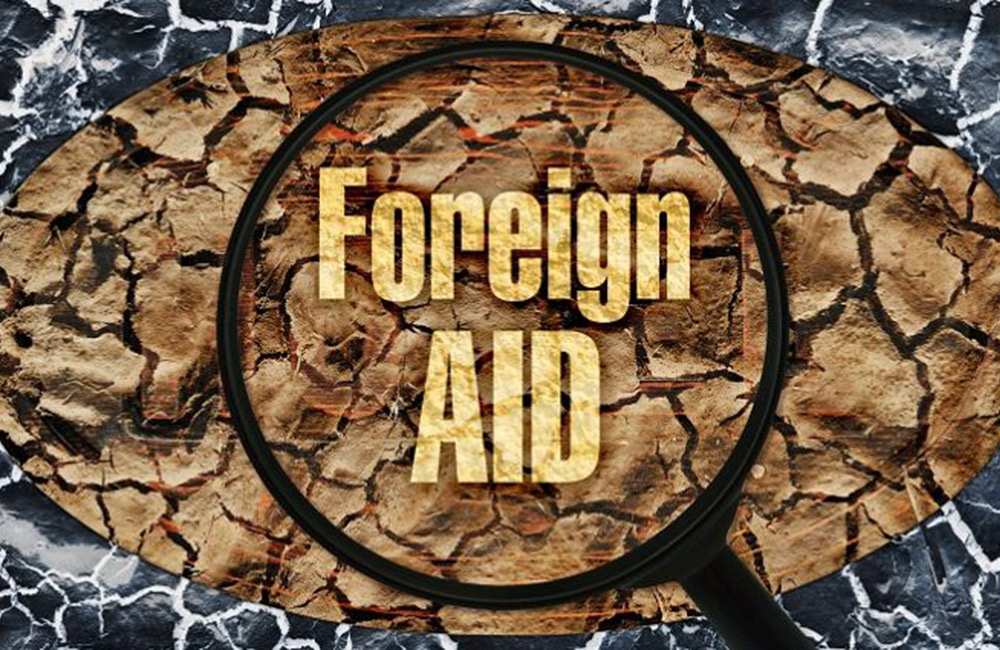
COVID-19: Foreign aid issue to boomerang on SL
Despite repeated denials of Prime Minister and Finance Minister Mahinda Rajapaksa that Sri Lanka still not received any foreign aid to sustain in corona virus crisis, the United States has announced the commitment of more than US$ 4.5 million to help Sri Lanka in its fight against Covid-19.
This brings the total U.S. contribution to US$ 5.8 million, the Embassy of the United States said in a press release issued today (06).
The EU has approved Euro 22 million on April 09 while the World Bank has made a commitment of $128.
The Asian Development Bank (ADB) has allocated a $600,000 grant from the Health System Enhancement Project to the Government of Sri Lanka to finance preventive and response efforts to fight a potential novel corona virus (COVID-19) outbreak in the country.
China has extended financial assistance amounting to $500 million to Sri Lanka to help the island nation combat COVID19 and another $ 500 million is on the pipeline.
Statements made by high interim government authorities including ministers’ claiming that the country coffer 'has not received foreign assistance to state coffers will boomerang into the country international repercussions,economic experts warned.
Announcing the new US aid, U.S. Ambassador to Sri Lanka Alaina B. Teplitz has said “This assistance continues the long tradition of U.S. support for Sri Lanka’s security and sovereignty,”.
“Over the past 20 years, U.S. assistance in Sri Lanka has totalled more than US$1 billion, including US$ 26 million for health.”
This assistance, channelled through the United States Agency for International Development (USAID), includes US$ 2 million to increase social services for areas and populations most impacted by the crisis, and support for activities that build social cohesion.
Another US$ 2 million will strengthen small and medium enterprises and increase women’s economic participation.
As part of the newly-announced assistance, the United States is also providing $590,000 in humanitarian assistance that will support vulnerable people during the pandemic, the release revealed.
This new assistance builds on the US$ 1.3 million in health assistance the U.S. Embassy announced on April 9, which is helping the government prepare laboratory systems, activate case-finding and event-based surveillance, and support technical experts for response and preparedness.
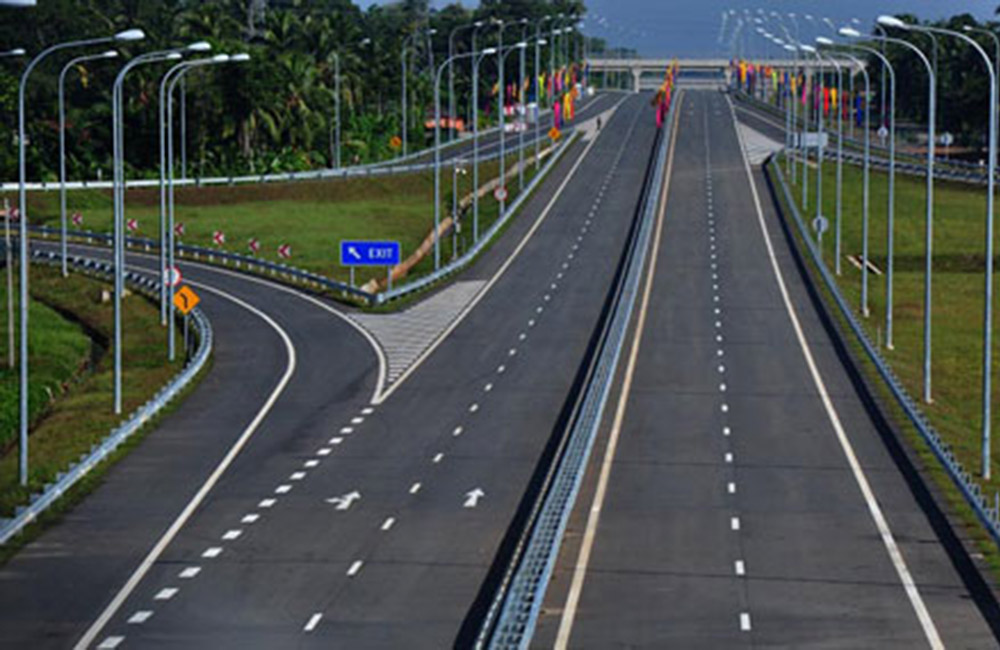
Cabinet approves borrowing of Rs. 31.7bn to kick start first stage of Central Expressway
The Sunday Times: The Highways Ministry and the Road Development Authority (RDA) have received Cabinet approval to borrow more than Rs 31.7bn from foreign or domestic sources to kick start the stalled construction of the first section of Central Expressway (CEP I).
Amidst the curfew, there are also negotiations—sanctioned by the Cabinet—with handpicked parties canvassing for the third and fourth sections of the same expressway (CEP III and IV), the Ruwanpura Expressway from Kahathuduwa to Pelmadulla (via Ratnapura) and the Eastern Expressway from Mattala to Pottuvil.
Only selected Ministry and RDA officials are privy to the details or even know such discussions are ongoing. The hundreds of kilometres of new roadways will require heavy borrowing, both local and foreign. The majority of projects will be Chinese-funded, according to the relevant Cabinet paper which the Sunday Times obtained.
While the relevant Cabinet memo and approval say expressions of interest (EOIs) will be called for CEP III and the second section of the Ruwanpura Expressway, authoritative internal sources said this was “just window dressing”. The parties have already been identified.
Any projects that do go through the pipeline now will be based on feasibility studies that are either outdated or will be carried out at a time of global unpredictability when even the International Monetary Fund (IMF) is forecasting the worst recession since the Great Depression of the 1930s.
The Rs 31.7bn to be raised for CEP I—from Kadawatha to Mirigama—is the mobilisation advance, without which that phase has been stuck. In 2015 and 2016, two contracts were awarded for this section to the M/s Metallurgical Corporation of China (MCC) Ltd. The agreement for a loan of more than US$ 990mn was signed with the Exim Bank of China in March last year. But the project was stalled as the Government could not raise the mobilisation funds.
The second section, CEP II—from Mirigama to Kurunegala—is being built by four local construction consortiums comprising 15 companies. It is funded through the national budget and several local banks. Around 80 percent of physical progress has been completed at the cost of Rs 96.6bn.
However, a further Rs 40bn is required to complete the project by August this year. The RDA, in consultation with the Finance Ministry, is now looking to raise funds through bonds or debentures. And Cabinet approval has been granted to approach local banks to bridge any deficit.
The third section, CEP III—from Pothuhera to Galagedara—was awarded to Japan’s M/s Taisei Corporation Ltd in 2018 on the understanding that Mitsubishi UFJ Financial Group (MUFJ) of Japan would lend 100bn Yen for it.
Talks between MUFJ, Nippon Investment and Export Insurance (NEXI) and the Sri Lanka Government started in 2015 but remained inconclusive as the Attorney General’s (AG) Department in Colombo and the Finance Ministry’s External Resources Department (ERD) could not agree to certain clauses of the proposed agreement. For example, the AG did not clear the anti-corruption provisions, saying they were not compatible with Sri Lankan laws.
With its complicated terrain and land acquisition requirements, the 32.5 kilometre CEP III is tipped to be one of the most expensive road initiatives undertaken in recent times. More than 1,162.5 acres occupied by 2,069 households (8,465 people) in 97 villages will be hit, requiring permanent relocation for 857 of them.
Now, four other parties have shown interest. They are Roughton International Ltd, a consultancy firm registered in the UK but now owned by a Sri Lankan named Ranjith Gunaratne, the Managing Director of MG Consultants Pvt Ltd; M/s China Chemical Engineering Second Construction Corporation (CCESCC); M/S China National Aero Technology (AVID-ENG); and M/s Beijing Urban Construction Group Co Ltd (BUCG).
But Roughton has since “agreed” to shift its interest to CEP IV instead of III, official sources said, indicating that deals were being struck behind the scenes. The Cabinet paper also said, “But later they offered this facility for Section 4 instead of Section 3.”
Meanwhile, neither CCESCC or BUCG has submitted assurance of financing or term sheets. This leaves just CATIC or AVIC-ENG in the running and, the sources pointed out, “It smacks of a fix.”
Cabinet has now granted approval to cancel the agreements with Taisei and the financial negotiations with MUFJ/NEXI. It has authorised the Highways Ministry to call for EOIs from all prospective contractors with 100 percent financing for the total contract price of CEP III.
But no EOIs have yet been called for and internal sources said talks are ongoing with CATIC/AVIC-ENG. Local contractors also expressed fear that conditions will be tailored into a bid—should it be floated—to ensure that only a specific party will qualify.
The fourth section—from Kurunegala to Dambulla—was awarded in 2016 to China’s Gazhouba Group International Engineering Co Ltd for a cost of Rs 161bn (excluding VAT). But there was no funding source.
Roughton International has submitted a preliminary proposal, pledging funding from UK Export Finance. “They propose to entrust the entire construction works to local construction companies,” the Cabinet paper says.
Additionally, CCESCC and CATIC (AVIC-ENG) submitted proposals but without financing or term sheets. The Cabinet has, therefore, agreed to the ERD evaluating Roughton’s financial terms on the grounds that the Highways Ministry requests a detailed technical proposal from the company and evaluates it through a Cabinet Appointed Negotiation Committee and a Technical Evaluation Committee.
The Ruwanpura Expressway is currently divided into three sections. The Highways Ministry has proposed to start construction of the 52.5km from Kahathuduwa to Ratnapura via Ingiriya and the remainder based on funding availability.
In 2016, the Cabinet split the Ruwanpura Expressway into four and chose one Chinese party for each leg: China National Technical Import and Export Corporation (CNTIC); CATIC-ENG; Hunan Construction Engineering Group Corporation (HCEGC); and China Harbour Engineering Company Ltc (CHEC). But a request for proposal was only invited from CNTIC, not for the other sections.
The Cabinet has now given approval for the Highways Ministry to request M/s CNTIC to 100 percent financing for the cost of Ruwanpura Section I; authorised the ERD to pursue funding for Section II; and sanctioned the Highways Ministry to invite competitive EOIs from all prospective contractors for 100 percent financing for the total price of Section II.
In terms of the Eastern Expressway (Mattala to Pottuvil), the ERD has been authorised by the Cabinet to pursue funding for feasibility study, preliminary and detailed designs, and construction, in consultation with the National Planning Department.
Attempts to contact Highways Minister Johnston Fernando and Highways Ministry Secretary R W R Pemasiri failed.
Page 406 of 663